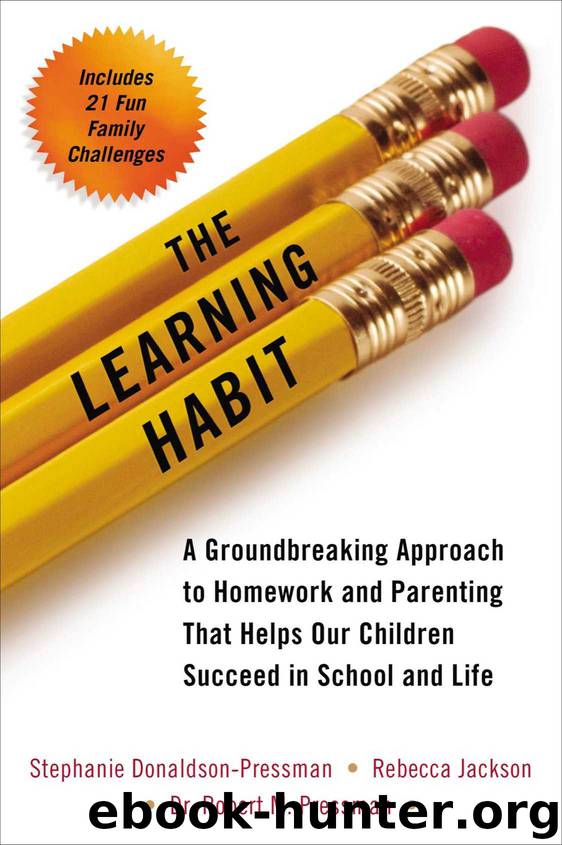The Learning Habit: A Groundbreaking Approach to Homework and Parenting that Helps Our Children Succeed in School and Life by Stephanie Donaldson-Pressman & Rebecca Jackson & Robert Pressman

Author:Stephanie Donaldson-Pressman & Rebecca Jackson & Robert Pressman [Donaldson-Pressman, Stephanie]
Language: eng
Format: epub
Publisher: Penguin Group US
Published: 2014-09-02T00:00:00+00:00
HOW KIDS GET FROM POINT A TO POINT B
FIGURE 6.1
When helping your child discuss a goal (be it learning to make their bed, managing media usage, getting on the honor roll, graduating from college, or successfully riding a two-wheeler), there are steps to consider.
Case Study: Aaron and Dad
Aaron (age 10) was frustrated. “I can’t believe I have to write a book report. It’s gonna take too long, and I’m gonna hate this book. I can’t do it,” complained Aaron, as he chewed his lasagna.
“Well,” his father replied, “The first step is to read the first word in the book. Have you done that yet?”
Aaron: [rolling his eyes] Yes.
Dad: Then you’re making progress. The next step is to read the first paragraph. Have you done that?
Aaron: Yeah, Dad, I’m on page 14, but it’s taking forever.
Dad: When is the report due?
Aaron: Next Friday.
Dad: So. That’s nine days away, right?
Aaron: It might as well be nine months!
Dad: How many pages are in the book?
Aaron: Um [checking the book], 243, but a couple of them are pictures.
Dad: Well, if you had to read it all tonight, that could be a problem! But your teacher says that 20 minutes of reading will probably get you through 20 pages, right? That’s why she asked you to read for 20 minutes every night.
Aaron: I know, Dad, and if I’d done that, I’d be through and have the report done and—
Dad: Hang on, buddy; no blame, no foul. What I was going to say was that if you read—no distractions—for 30 or 35 minutes after supper, you’ll get 33 to 35 pages read and finish the book in seven days. That leaves you two days to write the report.
Aaron: [laughing] Good math skills, Dad! But, only 35 minutes of reading?
Dad: It isn’t that long, if you’re really involved in doing something. That’s about the time we’ve been here eating supper. I have a proposition for you; let’s set aside 40 minutes after supper, and you and I will go into the den and read. Just the two of us, no TV, no phones, door closed; sit on the couch and read.
Aaron: You’d do that?
Dad: Of course! I like to read, Aaron; sometimes I just get so caught up in stuff I have to do that I don’t make the time. I have that new mystery that Mom put on my Kindle, and I’d enjoy having some dedicated time to read it. Do we have a deal?
Aaron: Yeah. OK, I guess. It doesn’t sound that bad.
Dad: I can see it now—Aaron brings home his book report, with a big A and a written comment on the top, “Great job, Aaron!”
Aaron: [groaning—but smiling, too] Whatever!
Aaron’s father facilitated the setting up of a realistic goal that:
Was important to Aaron (read the book and do the report)
Was time-limited (nine days)
Was broken down into small steps (35 to 40 minutes a night)
Had measurable short-term outcomes (33 to 35 pages a night)
Had a visual image to capture the goal (the report
Download
This site does not store any files on its server. We only index and link to content provided by other sites. Please contact the content providers to delete copyright contents if any and email us, we'll remove relevant links or contents immediately.
Teach Your Child How to Think by Edward De Bono(2159)
Little Soldiers by Lenora Chu(1354)
NLP For Parents by Judy Bartkowiak(1269)
The Book of Virtues by William J. Bennett(1173)
Dotcom Secrets by Russell Brunson(1143)
Lost at School by Ross W. Greene(1091)
Happy Is the Bride by Lori Wilde(1078)
The Homeschooling Handbook by Mary Griffith(1042)
The Enlightened College Applicant by Andrew Belasco & Dave Bergman(1040)
What to Expect the First Year by Heidi Murkoff(1022)
The Book of Ruby(1014)
LESSONS_IN_LOVE by Administrator(1003)
The Physics Book by DK(983)
The Gift of Failure by Jessica Lahey(971)
The New Sex Bible by Jessica O'Reilly(967)
Living Out Loud by Anna Quindlen(967)
Math with Bad Drawings: Illuminating the Ideas That Shape Our Reality by Ben Orlin(965)
Weapons of Mass Instruction by John Taylor Gatto(943)
The Most Important Year by Suzanne Bouffard(904)
